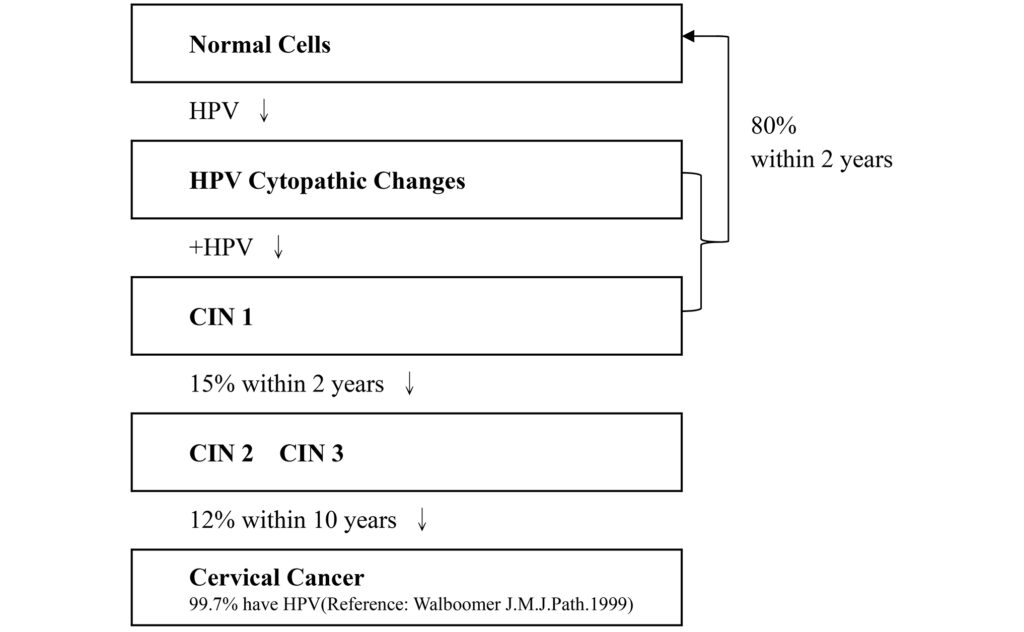Colposcopy
Colposcopy
There are many reasons for having abnormal cells in the Pap smear test. If your Pap smear test shows abnormal cells, you will need a further examination called as colposcopy to see if there is any abnormality in the cervix and vagina. If an abnormality is found, treatment can be planned accordingly.
What is Colposcopy?
Colposcopy is a procedure to closely examine the cervix and vagina with a special magnifying instrument called a colposcope. The aim is to enlarge the images to look for areas with unusual features to allow further examination and treatment.
Colposcopy examination is similar to a gynaecological examination. During the examination, you will have to lie down on a bed with your legs in supports. The doctor will place a speculum in your vagina to allow him / her to examine the cervix. The doctor will apply different kinds of solution to your cervix which help to highlight any suspicious area where a sample(s) of tissue can be collected for laboratory testing (biopsy). The whole procedure will take around 10 to 20 minutes, during which you may feel some discomfort. You may experience some very light bleeding from the vagina in the next day or two. Therefore, it is advisable to bring a sanitary napkin.
Furthermore, when you are having your menstrual period, the blood will obscure the view of the colposcope. If this happens, please contact our clinic during office hours to change the appointment time. If you are pregnant, you must let the doctor know and discuss with your doctor whether you can still proceed with the colposcopy.
You may experience some light bleeding from the vagina in the coming few days. This is very common, and you should not worry about it. Please avoid sex for one to two weeks after the examination. If any unusual situation arises, please contact our clinic to arrange a medical consultation.
Follow ups after colposcopy examination
Management of Low-grade Squamous Intraepithelial Lesion (LGSIL), Human Papillomavirus (HPV) cytopathic changes or Cervical Intraepithelial Neoplasia 1 (CIN 1):
HPV cytopathic changes and CIN 1 belong to LGSIL. In 80% of these patients, the condition will resolve by itself and hence no treatment is necessary. For some patients, the condition may persist or worsen. The remaining minority may turn into cervical cancer in 10 years’ time. Fortunately, it takes a very long time for the condition to worsen. Hence a regular Pap smear test can help to prevent the development of a cancer.
During the period of observation, you must have Pap smear test regularly. If the condition worsens during the observation period, or the abnormal cells persist, the doctor may advise you on further treatment.
Management of High-grade Intraepithelial Lesion (HGSIL), Cervical Intraepithelial Neoplasi 2 (CIN 2) or Cervical Intraepithelial Neoplasia 3 (CIN 3):
CIN 2 and CIN 3 belong to HGSIL. These conditions may turn into cancer in a few months’ or a few years’ time. Therefore, the doctor will advise you on further treatment.
Abnormal Pap smear tests represent a spectrum of diseases ranging from LGSIL, HGSIL and even cervical cancer.
HPV
Human Papillomavirus (HPV) infection by itself does not warrant any treatment. But a persistent infection will bring about abnormal changes in the cervical cells called CIN. HPV and CIN can be present at the same time.
Cervical Intraepithelial Neoplasia (CIN)
CIN means there are pre-cancer changes in the cervical epithelial cells. The pre-cancer changes can be divided into three stages according to their severity: CIN 1, CIN 2 and CIN 3, with CIN 3 being the worst. CIN, especially in the early stages, do not cause any symptom. If a severe type of CIN 3 left untreated, it may turn into cervical cancer in months or years.
Cancer of Cervix (cervical cancer)
The most severe type of CIN may turn into cervical cancer. According to statistics, cervical cancer is one of the 10 killers amongst female cancer patients in Hong Kong. There are around 500 patients diagnosed with this disease every year, and more than 100 patients died of this disease annually. However, if the condition can be diagnosed and treated early, the survival rate can be as high as 90%.
Any questions About Our Clinic?
Don't Hesitate to Contact Us
Contact number
(852) 2117 3033
hkreproductivehealth@gmail.com
Opening Hours
MON - FRI :
0900-1800
(Lunch hour 1400-1500)
SAT :
0930-1530
Closed on Sundays & Public Holidays




